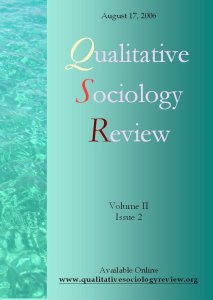Researching the Intersection between Collective Identity and Conceptions of Post-separation and Divorced Fatherhood: A Case Study Fathers For Justice, Fathers For Just Us, or Fathers are Us?
DOI:
https://doi.org/10.18778/1733-8077.2.2.06Keywords:
Fathers rights movement, collective identity, participant observation, interviews, content analysisAbstract
This article explores the methodological implications of investigating the collective identity of Fathers For Justice (FFJ). More specifically, a three-pronged approach of employing participant observation, interviews, and content analysis is assessed as the basis for understanding FFJ’s collective identity. This methodological approach reveals that meanings and practices related to post-separation and divorced fatherhood as well as the importance of children are a significant dimension of a FFJ collective identity. I conclude that an important part of the FFJ collective identity is not based on these activists perceiving themselves as self-serving (Fathers for Just Us), but as those seeking equality in terms of being recognized as continous parents after separation and divorce (Fathers are Us).
Downloads
References
Arendell, Terry (1992a) “After Divorce: Investigations into Father Absence.” Gender & Society 6(4): 562-586.
Google Scholar
DOI: https://doi.org/10.1177/089124392006004003
Arendell, Terry (1992b) “The Social Self as Gendered: A Masculinist Discourse of Divorce.” Symbolic Interactionism 15(2): 151-181.
Google Scholar
DOI: https://doi.org/10.1525/si.1992.15.2.151
Babbie, Earl (1989) The Practice of Social Research. 4th edition. Belmont, California: Wadsworth.
Google Scholar
Babbie, Earl and Lucy Benaquisto (2002) The Fundaments of Social Research. 1st edition. Toronto: Thomson.
Google Scholar
Bertoia, Carl and Janice Drakich (1993) “The Fathers Rights Movement: Contradictions in Rhetoric and Practices.” Journal of Family Issues 14(4): 592-615.
Google Scholar
DOI: https://doi.org/10.1177/019251393014004007
Bertoia, Carl (1998) “An Interpretative Analysis of the Mediation Rhetoric of Fathers’ Rightists: Privatization Versus Personalization.” Mediation Quarterly 16(1): 15-32.
Google Scholar
DOI: https://doi.org/10.1002/crq.3890160104
Boyd, Susan (1989) “From Gender Specificity to Gender Neutrality? Ideologies in Canadian Family Law.” Pp. 126-157 in Custody and the Politics of Gender, edited by C. Smart and S. Sevenhuijen. New York: Routledge.
Google Scholar
Coltrane Scott and Neal Hickman (1992) “The Rhetoric of Rights and Needs: Moral Discourse in the Reform of Child Custody and Child Reform Laws.” Social Problems 39(4): 400-421.
Google Scholar
DOI: https://doi.org/10.1525/sp.1992.39.4.03x0046t
Crean, Susan (1988) In the Name of the Fathers. Toronto: Amanita.
Google Scholar
Dominus, Susan (2005) “The Fathers’ Crusade”. The New York Times Magazine, May 8, pp. 26-33, 50, 56, 58.
Google Scholar
Drakich, Janice (1989) “In Search of the Better Parent: The Social Construction of Ideologies of Fatherhood.” Canadian Journal of Women and the Law 3(1): 69-87.
Google Scholar
Escobar, Arturo (1992) “Culture, Economics, and Politics in Latin American Social Movements.” Pp. 62-85 in The Making of Social Movements in Latin America: Identity, Strategy and Democracy, edited by A. Escobar, and S. Alvarez. Boulder: Westview.
Google Scholar
DOI: https://doi.org/10.4324/9780429496301-6
Eyerman, Ron and Andrew Jamison (1991) Social Movements: A Cognitive Approach. Cambridge: Polity.
Google Scholar
Gairdner, William (1990) The Trouble with Canada. Toronto: Stoddart.
Google Scholar
Harris, Scott (2000) “The Social Construction of Equality in Everyday Life.” Human Studies 23: 371-393.
Google Scholar
DOI: https://doi.org/10.1023/A:1005684130032
Kenedy, Robert (2004/5) Fathers for Justice: The Rise of a New Social Movement in Canada as a Case Study of Collective Identity Formation. Ann Arbor, Michigan: Caravan Books.
Google Scholar
Melucci, Alberto (1989) Nomads of the Present. London: Hutchinson and Radius.
Google Scholar
Melucci, Alberto (1995) “The Process of Collective Identity.” Pp. 41-63 in Social Movements and Culture, edited by H. Johnston and B. Klandermans. London: UCL Press.
Google Scholar
Mills, Charles Wright (1959) The Sociological Imagination. New York: Oxford University Press.
Google Scholar
Mottl, Tahi (1980) “The Analysis of Countermovements.” Social Problems 27(5): 620-635.
Google Scholar
DOI: https://doi.org/10.2307/800200
Pichardo, Nelson (1997) “New Social Movements: A Critical Review.” Annual Review of Sociology (23): 411-430.
Google Scholar
DOI: https://doi.org/10.1146/annurev.soc.23.1.411
Sauvé, March (1993) Personal communication. September.
Google Scholar
Shibutani, Tamotsu (1987) Society and Personality: An Interactionalist Approach to Social Psychology. New Brunswick, N.J.: Transaction.
Google Scholar
Touraine, Alain (1981). The Voice and the Eye: An Analysis of Social Movements. Cambridge: Cambridge University Press.
Google Scholar
Touraine, Alain (1988) Return of the Actor: Social Theory in Post-Industrial Society. Minneapolis: University of Minnesota Press.
Google Scholar
Zald Mayer and Bert Unseem (1987) “Movement and Countermovement Interaction: mobilization, tactics, and State Involvement.” Pp. 319-336 in Social Movements in an Organizational Society, edited by M. Zald and J. McCarthy. New Brunswick, NJ: Transaction Books.
Google Scholar
Downloads
Published
How to Cite
Issue
Section
License

This work is licensed under a Creative Commons Attribution-NonCommercial-NoDerivatives 4.0 International License.











